5 Best Portuguese Courses and Resources for 2025
Learn Brazilian Portuguese with the best online courses and resources put together by a language tutor.

Quick Access:
- For Beginners: PortuguesePod101, Virginia, Pimsleur
- Flashcards: Anki, Memrise, Quizlet
- Quizzes: QuizTree, ClozeMaster
- Books: Modern Brazilian Portuguese Grammar, Portuguese-Portuguese Dictionary
Learning another language is not the final destination; It’s a way to connect with people from different cultures and be able to experience their traditions, food, art, music, and so on. And sure enough, we have plenty of that in Brazil.
But before you can explore Brazil, you need to start with the very basics of Portuguese that will allow you to survive in everyday situations.
Mastering the basics starts by learning greetings, talking about family and friends, giving directions, and asking for things. Laying those foundations is important to give you the main blocks that will allow you to pursue more advanced topics (like watching “Cidade de Deus” or “O Auto da Compadecida”).
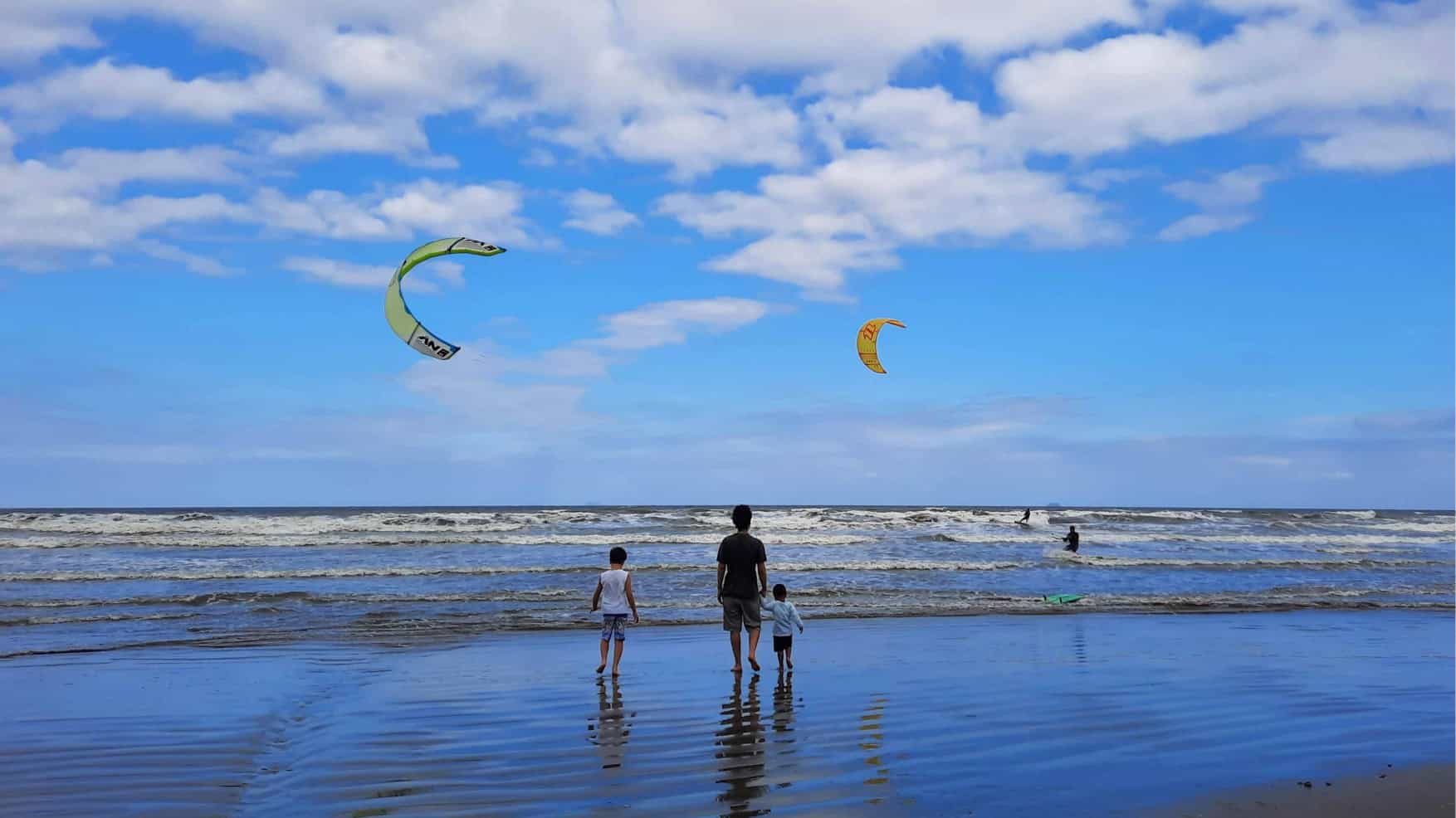
I’ve drawn from my experience as an ESL (English as a second language) instructor to create this Best Courses Guide (BCG) and give you the best methods for language learning backed by neuroscience. We will explore the language learning strategies and pair them with the best online resources and courses.
Click on the shortcuts for more details:
- Spaced Repetition
- Active Recall
- Leveraging Cognates and Chunking
- Best Bite-Sized Vocabulary Lessons for Beginners (PortuguesePod101)
- Best Bite-Sized Listening Practice for Intermediates (Virginia Langhammer)
- Best Course for Longer Study Sessions (Pimsleur)
- Best Modern Grammar Book (Modern Brazilian Portuguese Grammar)
- Best Portuguese-Portuguese Dictionary (Michaelis)
- Why You Should Trust Us
- How We Made Our Picks and Tested Them
Learning Guides
Spaced Repetition
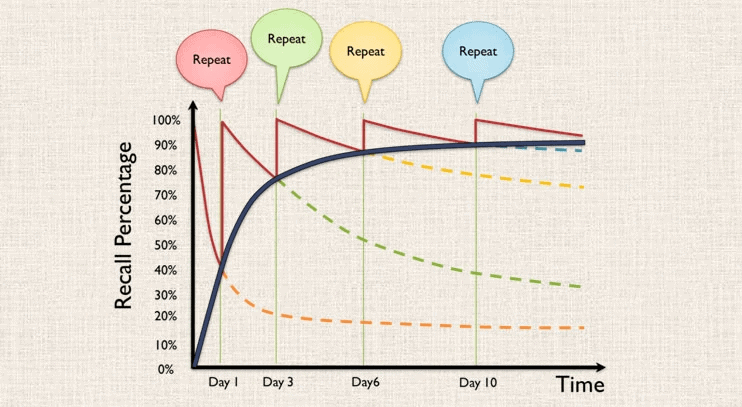
When I started learning English, I used to memorize long lists of vocabulary. This was a very popular approach in the early 2000’s, and by searching for “English for beginners” most websites just gave different lists to go through: 1000 most common English words, 100 sentences you’ll need to travel, etc.
After one year of self-study I could read and write ok for a beginner, but listening was lacking (we didn’t have many podcasts available yet). Unfortunately, those study sessions weren’t as effective as they could have been. I missed one important part of the learning process: Spaced Repetition.
Using only pen and paper, I only studied the material when I was “feeling like it”. Which wasn’t nearly often enough. On top of that, I’d cram the same 100 new vocabulary into one week-study and then never look back at it again. A few weeks later, I tested myself and realized I’d seen those vocabs before but couldn’t remember what they meant anymore. I was clearly missing something.
So, I enrolled in a traditional language course (quite expensive one) and realized their material used spaced repetition. Their books break up information into small chunks and review them consistently over a period of time. What you learn today will be reviewed tomorrow, then after a few days, then one week, then next month, and maybe they will test your knowledge on that same topic again by the end of the module. But worry not, it will come back again next module a few more times just to make sure you got it!
This approach takes advantage of the brain’s consolidation process, where information is integrated into long-term memory during breaks between study sessions.
How to implement that:
Use Spaced Repetition Tools: Apps like Anki or Memrise are designed to help you review flashcards at spaced intervals. You don’t need to worry about coming back to the material as they use algorithms to adjust the timing of reviews according to how well you remember each item in the previous session: got it right – review it again at a later time; got it wrong – review it more frequently.
Here are some Anki decks you’ll find useful:
- Portuguese > English – 1000 Verbs
- The 55 Sounds of Brazilian Portuguese
- Portuguese Core 100 – Basic words
- Portuguese Sentences with Audio
- Portuguese Sentences
- Speaking Brazilian School
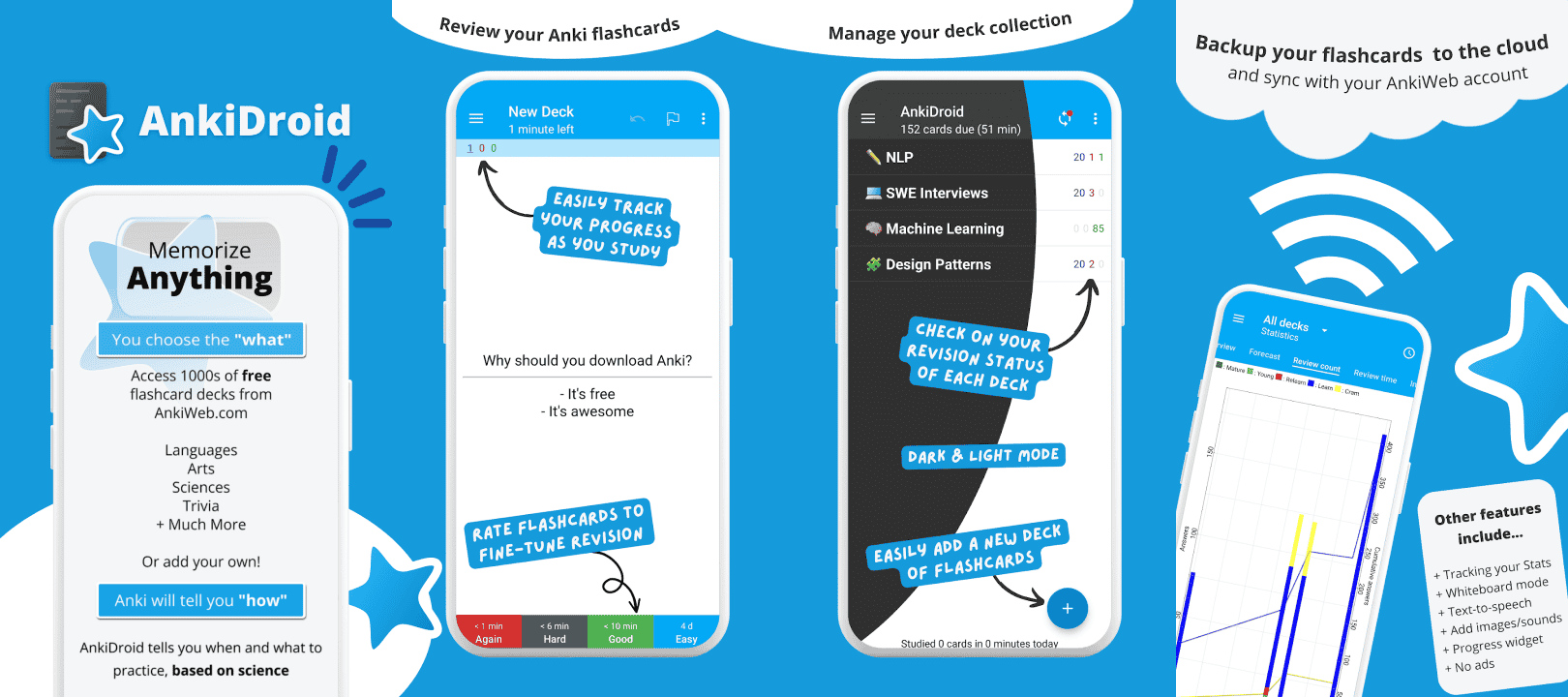
Focused Study Sessions: When I didn’t know any better, study sessions happened whenever I could afford enough time to review the big lists of vocabulary and had a ton of motivation to go through it. Again, not ideal. Motivation shouldn’t be a factor in your learning process since it’s a limited resource. Make it a habit! Also, long study sessions are usually very tiring and can create friction in the process. How should that be, then?
Studying for 10 minutes before breakfast everyday, for example, can be more beneficial than one hour session per week. This regular, brief engagement helps reinforce learning without overwhelming cognitive load. This would be more effective and easier to create a study habit than just waiting for the right time and enough motivation.
Make It Enjoyable and Practical: Find out your interests in the target language. For example, a friend of mine is learning Japanese so he can watch anime without subtitles. This seemingly simple strategy will bring a deeper purpose to your learning.
Besides motivation, it will help you contextualize what you learn. Applying your learning in practical situations like having basic conversations or watching movies, can boost your learning efficiency. Engaging actively with the language forces you to use and remember the information better.
Some ways to apply that is:
- Engaging in conversation with native speakers or other learners using tools like Tandem, HelloTalk, or iTalki (paid)
- Surround yourself with the language through media such as films, music, and books
- Try to use the language in daily activities like writing your shopping list or navigating a map
- Aim to complete a transaction in a shop, order food in a restaurant, or ask for directions entirely in Portuguese.
These small challenges will motivate you to apply what you’ve learned in real-life situations.
Weekly Planning: Dedicate time each week to plan your learning activities for the next week. This helps in organizing what you need to study, and allows you to adjust your schedule based on progress or specific needs. If you want an application to help you organize your activities, you can either use a calendar app or a more sophisticated approach using Notion.
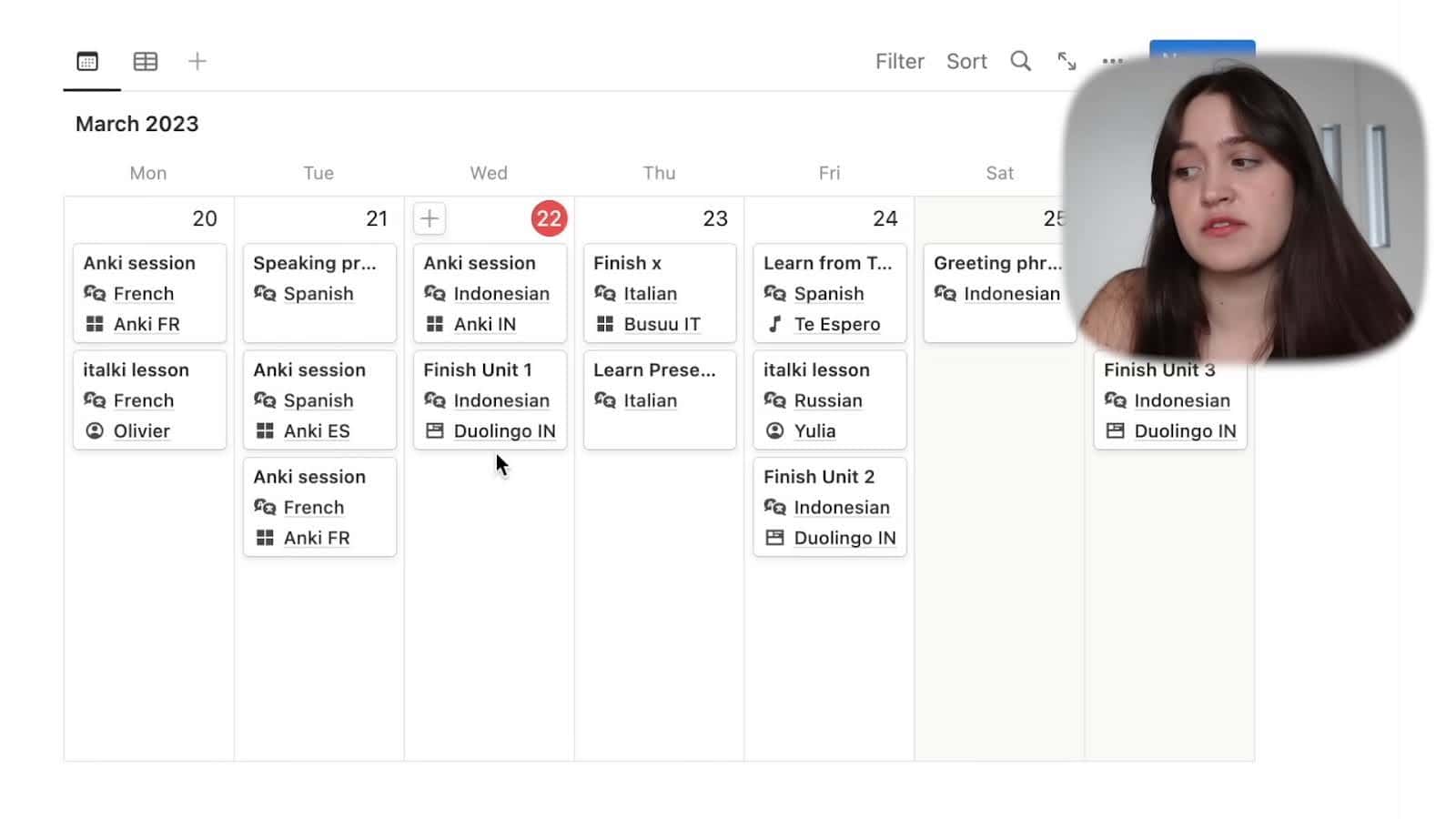
Active Recall
I always thought that quizzes and tests were a waste of time. As a language tutor though, I understood how testing is one powerful tool to find gaps in our knowledge and force our brain to strengthen neural connections related to the material. Recalling what we’ve learned can be done in many ways, from flashcards to games, and even teaching others.
How to implement that:
Self-testing: Begin each study session by trying to recall what you learned in the previous session. This could be through writing a short essay, speaking out loud, or summarizing key points without looking at your notes.
After reading a book or watching a video, close the material and write down everything you remember. This method can also be applied by verbally summarizing what you’ve learned (recording with your phone can be less awkward).
Flashcards: Apps like Anki and Quizlet allow you to create flashcards with questions on one side and answers on the other. Review them regularly without looking at the answers first. This forces you to recall the information rather than passively reading it.
Practice Tests: Many language learning apps and websites offer quizzes that require you to use the language actively. These quizzes can be a fun and engaging way to test your understanding and recall. For instance, QuizTree (free) and ClozeMaster (free, requires login) are both great websites.
Teaching Others: My wife and I have this agreement that we are free to share whatever we are learning over our meals. This has become a sort of tradition when we have our breakfast and talk about our studies. And it’s fun!
Trying to explain what you’ve learned to someone without using your notes requires you to recall the information actively and can reveal gaps in your knowledge. It is a powerful way to reinforce your own knowledge.
This can be done through:
- Talking to a friend or family member about your latest discoveries
- Record video lessons on topics you’ve mastered and share them with your friends
- Writing blog posts or recording podcast episodes
- Answer questions, provide explanations, and share resources on r/Portuguese on Reddit or other communities
- Join or create Facebook groups, LinkedIn groups, or other social media groups.
Leveraging Cognates and Chunking
As you learn new words in Portuguese, you can start to see how sometimes they might be very similar to English. They can also be combined to form new blocks (sentences or expressions) depending how they are ordered or change their meaning in different situations. These blocks, or chunks, are common in any language and it’s something you can use in your favor.
Relating new elements to those you are already familiar with can make learning more effective. This could involve linking new vocabulary to similar words in your own language or finding similarities in grammar or syntax.
How to implement that:
Use Analogies and Metaphors: Compare new words or grammar structures to similar concepts in your native language. For instance, if you’re learning Portuguese and come across the verb “correr” (to run), you might link it to the English word “corridor,” a place where you might run.
Create Mind Maps: Start with a concept you know and branch out to new vocabulary and phrases that relate to it. For example, if you already know the word for apple (“maça”), you could create branches to other fruits, colors of apples, or related verbs like eating.
Leverage Cognates: Many languages share common roots and thus have words that are similar in both form and meaning. Recognizing these can provide easy wins in vocabulary acquisition. For instance, English speakers learning Portuguese could connect “important” to “importante.”
Relate Through Stories: Create simple narratives using new vocabulary and grammar in the context of a familiar story or personal experience. This not only makes the learning process more enjoyable but also aids in better retention.
By integrating these neuroscience-backed strategies into your language learning routine, you can optimize your learning process and achieve better results in learning Portuguese.
Now, let’s explore the best content to pair your study sessions:
Best Bite-Sized Vocabulary Lessons for Beginners (PortuguesePod101)
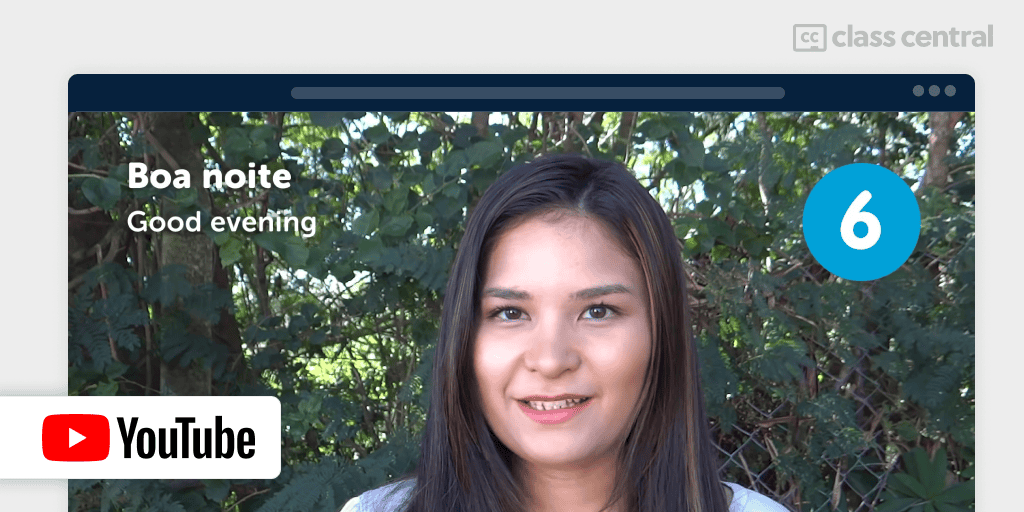
What I like about PortuguesePod101 video and audio lessons is that they are a couple of minutes long which is perfect for a 10 to 15 minute study session.They also use native speakers for their recordings simulating everyday situations with English explanations, making it a perfect selection for beginners.
Here are a few of my favorite playlists from their channel:
- Absolute Beginner Brazilian Portuguese for Every Day
- Portuguese Made Easy!
- Brazilian Portuguese Weekly Words
Apart from their YouTube channel, PortuguesePod101.com is an online platform with a collection of audio and video lessons with accompanying notes and flashcards. You can sign up for a free account that allows you to access the first three lessons of every series in all levels (100+ free lessons in total).
“Olá. Eu sou do México e comecei a ter aulas de português. Seus vídeos são muito úteis” Armando Rodriguez, YouTube learner
| Provider | Youtube |
| Channel | Learn Portuguese with PortuguesePod101.com |
| Instructor | Various |
| Time Commitment | 50 hours (platform) + YouTube |
| Cost | Free (limited) |
| Quizzes/Assessment Items | None |
| Certificate | None |
Best Bite-Sized Listening Practice for Intermediates (Virginia Langhammer)
Different from the previous course, Virginia Langhammer makes videos entirely in Portuguese with English subtitles. If you consider yourself more advanced but still need slower paced listening practice, you should check her podcast.
Virginia is a Brazilian instructor that hosts the YouTube channel Speaking Brazilian Language School, she also has free resources on her website and paid online courses from complete beginners to advanced levels.
Some of my favorite playlists from her channel are:
“The fact that there’s subtitles in both English and Portuguese makes it so much easier to understand and relate Portuguese words to English words while you are speaking. This in addition to you speaking at a good, slow pace is something that has made me play this video over and repeat what you say to work on my accent. Obrigada por seu trabalho!” mallorybreanne4791, YouTube learner
| Provider | Youtube |
| Channel | Speaking Brazilian Language School |
| Instructor | Virginia Langhammer |
| Time Commitment | NA |
| Cost | Free |
| Quizzes/Assessment Items | None |
| Certificate | None |
Best Course for Longer Study Sessions (Pimsleur)
Some learners prefer to dive into the subject they are learning. That’s when Pimsleur might be a great choice for you.
Pimsleur’s methodology revolves around working with the most useful vocabulary first. Each lesson starts with a fast paced conversation you would expect in real world situations. It goes beyond vocabulary and addresses pronunciation of those key sentences and expressions from the first lesson.
Each lesson is 30 minutes long, with 30 lessons per level. Different from the courses above, Pimsleur requires a longer commitment per study session (which might not be ideal for some). From the lessons I took, you can’t really break them down into smaller sessions because they require your full attention for that duration. Each lesson works with one specific situation and expressions/vocabulary commonly used in such.
You can sign up for free and get access to the first lesson to see how it works (no credit card required).
Pimsleur is well known in the language learning community. I found out about them through the r/Portuguese community.
Here is an in-depth review if you want to know more about the method from a learner’s perspective: “I find Pimsleur super helpful for learning because it focuses on listening first and then speaking, following the comprehensible input method of language learning.”
| Provider | Pimsleur |
| Instructor | Various |
| Time Commitment | 16 hours (per level) |
| Cost | Paid |
| Quizzes/Assessment Items | Flashcards and quizzes |
| Certificate | None |
Best Modern Grammar Book (Modern Brazilian Portuguese Grammar)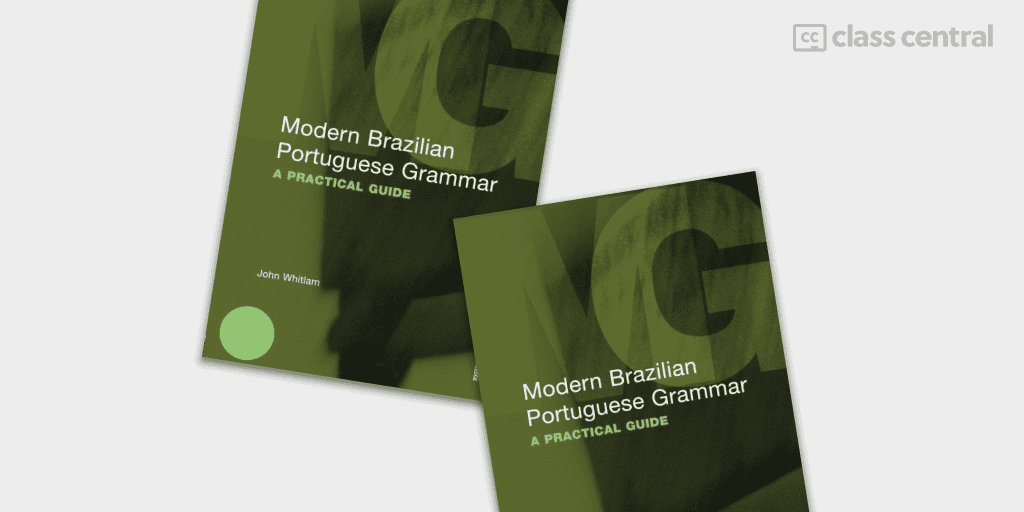
Grammar is not exactly a subject you have to learn to communicate in another language, but this book offers an interesting approach to exploring grammar from a function-based viewpoint, meaning: it emphasizes the language as it is spoken and written today.
It might be worth having it around for thematic reviews or even creating a few study sessions focused on grammar alone to get around it.
The book is divided into two parts. First, it covers traditional grammatical categories such as agreement, nouns, verbs and adjectives. The second part is carefully organized around language functions covering major communication situations such as introductions, meeting and greetings, expressing likes and dislikes, and so on.
Modern Brazilian Portuguese Grammar is a great resource for learners at all levels, from beginner to advanced.
John Whitlam is a freelance writer, university lecturer and lexicographer based in Rio de Janeiro. He has authored a number of language teaching books and project coordinated and co-authored three of the best-selling bilingual dictionaries of Portuguese and English.
“I am teaching myself Portuguese, and this book has helped immensely! I started using it when I was at a lower intermediate level. Some basic knowledge of Portuguese grammar and construction is needed to use this book (I completed Complete Portuguese: The Basics (Book and CD Set) before I bought this grammar).” David Miller, Amazon review
| Provider | Amazon |
| Author | John Whitlam |
| Pages | 496 (paperback) |
| Cost | Paid |
Best Portuguese-Portuguese Dictionary (Michaelis)
This is a personal favorite. I’ve been using the Michaelis dictionary since secondary school (paperback back in the day) and even nowadays I use their website at least once a week. This dictionary will do the trick for you most of the time. Alternatively, Dicionário inFormal is a slang dictionary with definitions provided by users, so keep that in mind and take those definitions with a grain of salt.
Why You Should Trust Us
Class Central, a Tripadvisor for online education, has helped 60 million learners find their next course. We’ve been combing through online education for more than a decade to aggregate a catalog of 200,000 online courses and 200,000 reviews written by our users. And we’re online learners ourselves: combined, the Class Central team has completed over 400 online courses, including online degrees.
How We Made Our Picks and Tested Them
Trying to find “the best” can be daunting, even for those of us who live and breathe online courses. Here’s how I approached this task.
First, I combed through Class Central’s Catalog and the internet to find a variety of free and paid open courses, some with certificates. You don’t need to enroll in a university to learn Brazilian Portuguese.
When choosing courses, I considered the following factors:
- Renowned Institutions: I looked for recognized institutions in Brazilian Portuguese
- Instructor experience: I sought instructors with extensive experience in Brazilian Portuguese and engaging presentation styles
- Popularity: I checked numbers of enrollments and views to find popular courses
- Course content: I examined courses that covered a range of topics and presentation styles, including the basics and more advanced topics. I watched some course videos to sample courses I hadn’t already taken
- Learner reviews: I read learner reviews (when available) to get a sense of the quality of each course, leveraging the Class Central database with its thousands of course ratings and reviews written by our users as well as available course provider reviews.
- Then, I defined the scope for these recommendations. A Brazilian Portuguese course can cover various topics, so I chose top courses from a range of sub-fields.
Ultimately, I used a combination of data and my own judgment to make these picks. I’m confident these recommendations will be a reliable way to learn Brazilian Portuguese.
If you think there is any resource missing I should add to this guide, leave a comment below.












